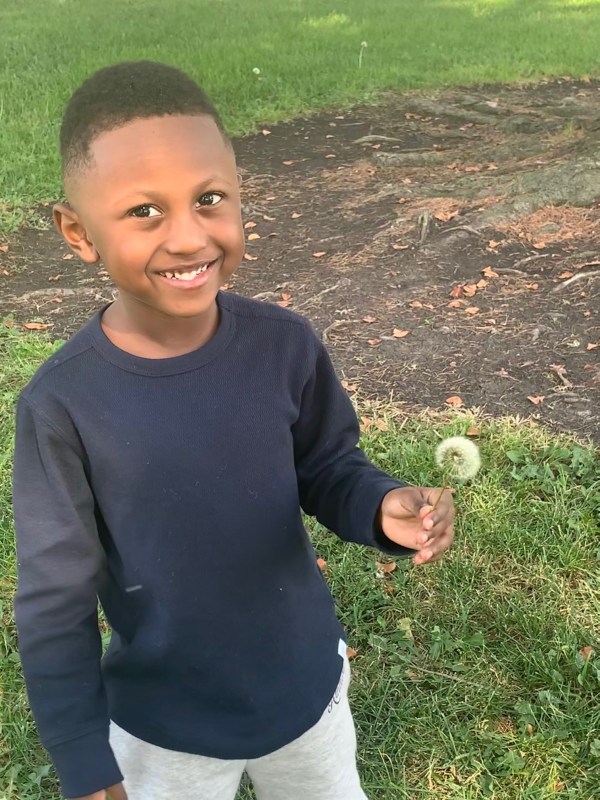I am very thankful for the MedicAlert bracelet. I feel more comfortable with I’mere wearing it – if I am not with him, someone will see that he has it on and will immediately know what to do.
Mother of I'mere, MedicAlert Member since 2020
Managing Multiple Conditions in Children: I'mere's Story
Meet I’mere – an active, friendly and totally lovable five-year-old. Like other boys his age, he loves going to the park, eating spaghetti and fruit, and visiting Disneyland. Nothing stops I’mere from playing an energetic game of hide and seek or enjoying his Sonic toys, not even a history of multiple conditions, including seizures and the blood disorder Hemoglobin E (HbE).
I’mere’s diagnosis of HbE and seizures are a worry for his mom, Chrishnique, and that’s why she chooses MedicAlert. Chrishnique states “I am very thankful for the MedicAlert bracelet. I feel more comfortable with I’mere wearing it – if I am not with him, someone will see that he has it on and will immediately know what to do.”
Over the past 65 years, millions of MedicAlert members have relied on our high-quality medical IDs to keep children and others with multiple conditions safe in an emergency. Because I’mere’s mom can’t be will him every moment, she relies on his ID for peace of mind.

While I’mere cajoles his mom to play a game of hide and seek, create backyard adventures, enjoy another family trip, or visit Disneyland as often as he can, Chrishnique can breathe easy knowing that MedicAlert will always protect her son.
Want to learn more?
About Hemoglobinemia E
Learn more about this condition on the medical conditions page.
Read More >
Other Conditions
Read about other conditions that our MedicAlert members live with.
Read More >
Keeping a child with multiple conditions safe in an emergency
I’mere is one of the more than 40% of school-aged children in the U.S. diagnosed with at least one chronic health condition. His specific diagnoses require extra steps like the ones his mother has taken to ensure his safety in an emergency.
Hemoglobin E is an inherited, rare yet mild blood disorder that usually presents itself during routine newborn screenings. Although considered mild, HbE can cause anemia, fatigue, growth failure, shortness of breath, or jaundice.
There are many types of seizure disorders in children, which affect almost half a million children in the United States. Most require special medication to help treat the seizures and all adults involved in the child’s care should be aware of the condition and what to do in an emergency.
How can parents manage multiple conditions?
For parents of children living with multiple diagnosed conditions, managing their daily activities and health can feel overwhelming. Along with keeping track of medical appointments, medications, and general safety related to multiple conditions, parents must become their child’s “expert” on the best care and treatment.
Some helpful tips for managing more than one diagnosis include:
- Join a parent support group related to the conditions for education and emotional support
- Lean on your child’s regular doctor to help you coordinate care between specialists
- Connect with university or medical research groups that support your child’s diagnosis for the latest testing and treatment options
- Organize medical information in one place as much as possible for easy reference
- Know what symptoms to look for that are a sign of an emergency
Why sharing every diagnosis with healthcare providers is important
Whenever your child sees a new healthcare provider for treatment, even if it’s only for one of their conditions, it’s important to share every diagnosis so your provider is able to choose the best treatment. Your child’s pediatrician should be able to provide complete medical records for each appointment.
In an emergency, where records aren’t easily available, it is still important that anyone treating your child know each diagnosis and medication they are taking. One way to do this is to choose a high-quality MedicAlert ID that lists multiple conditions. That way, even if you aren’t available in an emergency, first responders will know all details of your child’s health immediately.
Paired with a Protection Plan and our 24/7 Emergency Response Team, MedicAlert can relay all information stored in your child’s digital health profile to healthcare providers in an emergency. This level of support is exactly what puts your mind at ease as a parent—just like it does for I’mere’s mom.

